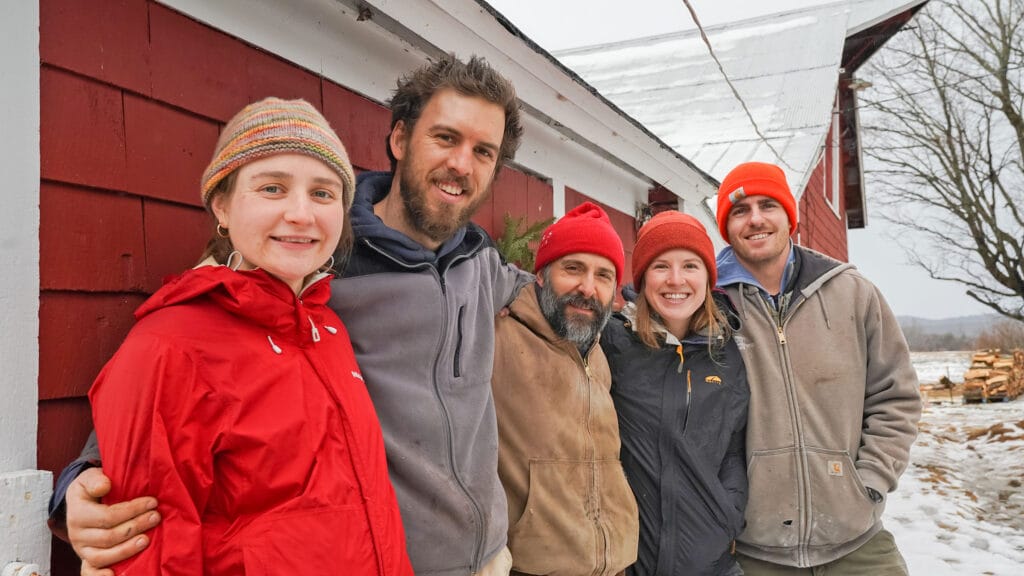Forging a path for collective land ownership at The Farm Upstream
5 min read / February 7, 2024 / By Rachel Mullis
Can't find what you're looking for? Please contact us.
5 min read / February 7, 2024 / By Rachel Mullis
Cory Froning and Jake Kornfeld stood in a slushy driveway wearing insulated boots and big smiles. Snow blanketed their property’s buildings and long, flat fields. Beyond, the valley was ringed by sleeping hardwoods and a bend of the Lee River in Jericho.
Jake pointed to the old farmhouse behind him, which was built in 1836. “We’re in the process of converting it into a duplex and restoring it,” he said. “It’s old, it needs a lot of love.”
The couple pointed out a small standalone garage that will hopefully serve as their farm stand come summer. That job will be handled by farm partner Tucker Andrews.
Cory, Jake, and Tucker are part of a farming quintet, along with Spencer Hardy and Jacqueline Huettenmoser, that has an unconventional plan to farm and manage the property: as a collective. They started by buying and conserving the land together in 2023. Their business is named The Farm Upstream.
The cooperative or collective farm, owned and operated by multiple farmers, isn’t common today. But the model has a long history in the U.S. and globally. It may be gaining more steam as farmers strive to gain access to land to make farming viable under increasingly tough conditions.
“Cooperatives spring up when people who are working class don’t have resources and are feeling the crunch of an unequal system,” said Jake.
In Vermont, small farmers face skyrocketing real estate prices, the rising costs of doing business, and increasingly extreme weather because of climate change. And while leasing land is a cheaper alternative in the short term, land ownership empowers farmers to invest in their business over time and become better stewards of the land.
“There are good things about leasing: you can get in very cheap and get out very cheap,” Tucker said. “But, the decisions to invest in infrastructure that will outlast the lease become much riskier. Sometimes it’s even hard to make soil management decisions.”
Still, creating a collectively owned farm business hasn’t been easy. The time and effort in making their dream a reality was often overwhelming. Many funders were hesitant to back the unfamiliar ownership model. The quintet sought guidance from lawyers, farm-focused podcasts, and dozens of local partners and mentors, including Burlington-based farm cooperative Diggers’ Mirth, to develop a rock-solid business plan.
All that hard work paid off. With the help of VLT, the Jericho Underhill Land Trust, a host of funders, and Martha Prince whose family had owned the farm, the farmers bought and conserved the parcel last fall. In 2024, The Farm Upstream plans to offer vegetables and grow from there.
“This project has been so exciting to us because we never believed that we could stay in our community and hang on to the relationships that are so important to us that we have here, and continue to build on those,” Cory said.
Cory and Jake had been searching for land for years. And they were excited when they learned of the Jericho farm for sale – it was minutes from Jericho Center, and with excellent ag soils. But the asking price was far beyond what they could pay. Conservation funding was crucial.
“The Vermont Land Trust was hugely helpful,” Jake added. “We couldn’t have done it without them.”

Left to right, Jacqueline Huettenmoser, Spencer Hardy, Tucker Andrews, Cory Froning, and Jake Kornfeld at The Farm Upstream in Jericho.
The collective farming model has enabled other benefits, too: As co-owners, the farmers provide each other with emotional support and have a more manageable workload.
“Stuff just kinda gets done,” said Tucker. “There’s so much personal and financial investment that people are motivated to do stuff by themselves.”
“This model brings a different feeling,” Cory agreed. “We’re all in it for the same reasons and there to help each other out and pick up the pieces.”
Photos by Kyle Gray